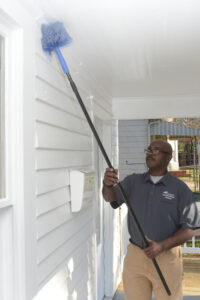Is Pest control safe?
If you’re like most people, the concept of “pest control” may conjure up images of spraying chemicals, traps, and other treatment methodologies. You may even go so far as to picture someone in a gas mask and hazard suit, surrounded by clouds of chemical products.
However, the truth is that pest control gets a worse reputation than it deserves. Modern pest control is nothing like the pest control of your grandparent’s day.
The fact is, there are dozens of regulatory requirements (both state and federal) that govern the creation, distribution, and use of pesticide products as well as other tools of the pest control trade. These regulations ensure that pesticide use is done safely and with a minimal amount of environmental impact.
The EPA regulates the pest control industry, and professionals must be properly licensed to make use of the products and tools they use.
But does this mean that pesticides are completely safe? Not quite. While properly used pesticides won’t cause you any harm, there is certainly some risk when pesticides are used improperly by people without the correct training.
To help explain this a bit better, I will quickly break down a few tips for staying pest-free SAFELY.
- 1. Work with a Reputable Company:
Remember those regulations and training we discussed earlier? Regulatory oversight only applies to companies that are properly registered with state and federal authorities.
Unfortunately, some dishonest individuals will masquerade as licensed pest control professionals when in fact they are operating without any certification.
These dubious companies are not vetted by any regulators, so you can’t be sure if they’ve received proper training or use correct procedures when treating your home. They might use products incorrectly or even use products that are not correct for the situation. This can expose people, pets, and the environment to unnecessary hazard.
Because of this risk, homeowners should only work with companies that are willing and able to produce certification of their legitimacy.
- 2. Toxicity and Exposure:
One of the most common questions that we get in our work is whether or a particular product is “safe” or not. While I would like to give a yes or no answer in such cases, the truth is that it depends on a lot of factors.
The truth is, many otherwise safe substances are dangerous in excess. Even oxygen is toxic in sufficient quantities. To understand the risk of certain products, it is necessary to evaluate that product’s toxicity, AKA how poisonous it is, and the amount of exposure a subject might experience.
In other words, where a product is placed and how much of that product is used is the main indicator of the risk level. Pesticide use regulations strictly limit the amount of pesticide that should be used and where a product is safe to use. A product that would be fine outdoors might be a major problem if released in an enclosed space.
This is another reason that working with a pest control professional is so important. A trained pro knows the ins and outs of the products they use, and this helps to ensure that your pest problems can be dealt with safely and effectively.
Proper application is also critical for pesticides to work properly. Improper use of a product limits its effectiveness and in some cases can negate it entirely.
- 3. ”Natural” Doesn’t always mean safer:
Occasionally, we will receive questions about whether or not the products we use are “natural.” This is an understandable sentiment. After all, we typically associate “natural” things as being less disruptive compared to an artificial alternative.
However, when it comes to pesticide products, “natural” does not necessarily mean better OR safer. Remember that, fundamentally, a pesticide is a poison designed to eradicate or repel pests. But just because a product is toxic to pests does not mean that it is toxic to you.
Due to differences in scale and physiology, many of the products that would terrify a housefly pose little to no threat to you. In fact, artificial pesticide products are specifically designed to limit risk to humans while maximizing the effectiveness against the target pest.
“Natural” pesticide products are simply substances that are toxic to pests and occur in nature. But since they are natural (and therefore not targeted in their treatment) they can sometimes pose MORE risk compared to an artificial alternative.
For example, arsenic is definitionally a “natural” product, but you certainly wouldn’t want it used to treat pests in your home. Rather than thinking of artificial products as a riskier imitation of natural options, you should instead view them as a refinement that increases safety without sacrificing effectiveness.
Conclusion: We’ve covered a lot of ground here but nothing in great detail. As such, you may have questions about specific products or practices in the pest control industry. If that is the case, then there is no better resource than a company with decades of experience in the pest control industry.
At Canton Termite and Pest Control, we take the responsibility of safe and environmentally conscious pesticide use very seriously. We stay up to date on regulations and innovations in the market. This helps us to ensure that we provide the highest quality of service to our customers!
So if you are looking for a safe, reliable solution to your pest problems, don’t wait! Call us TODAY at 770-479-1598 and start your pest free life today!
By: Tim

